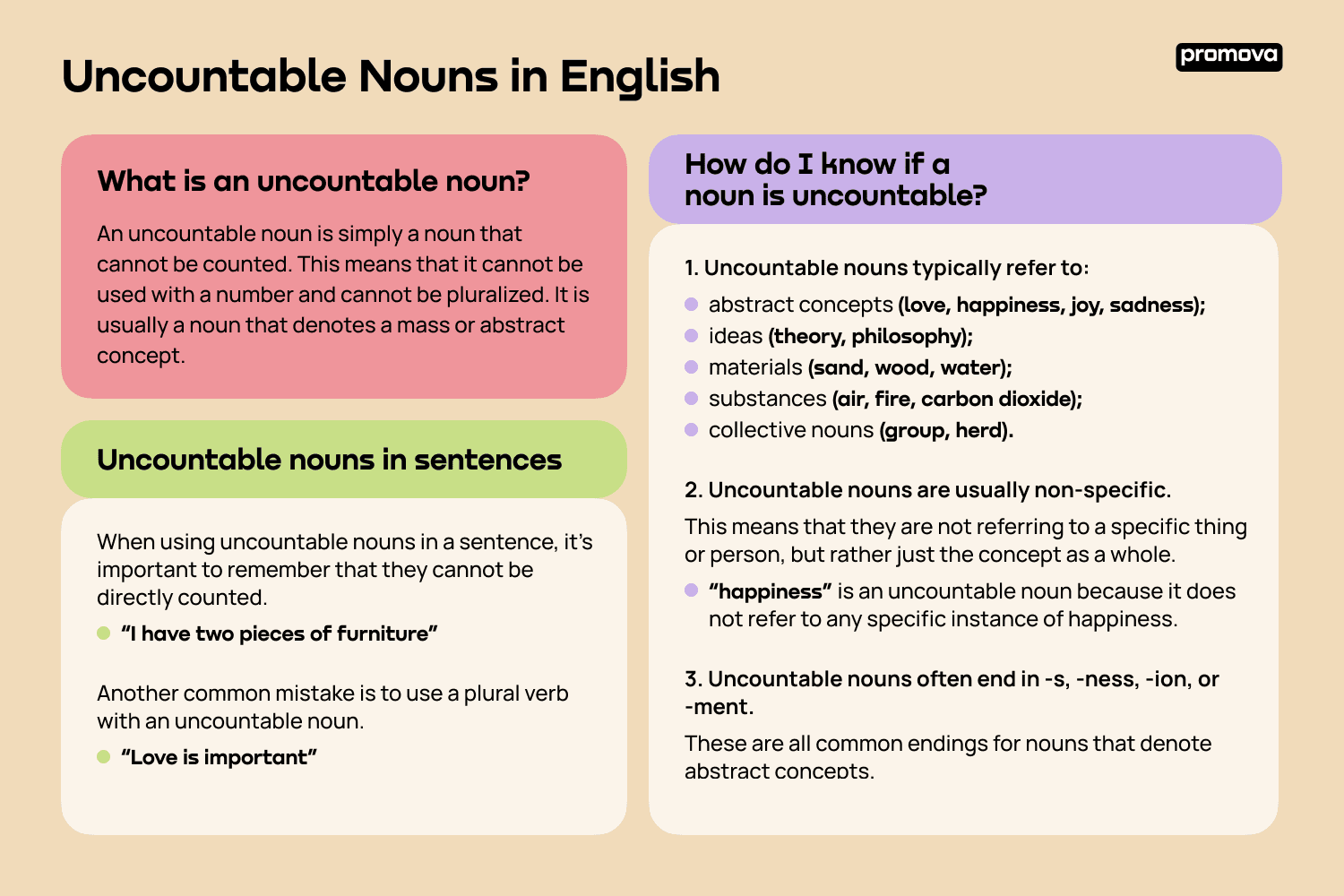Uncountable Nouns in English
Contents
Can't get a hang of uncountable nouns while you’re learning English? Don't worry, they're much easier to understand than most textbooks make it seem like! In this reference, we’ll discuss what uncountable nouns are, why they’re important, and how to use them correctly. Let’s get started!
What is an Uncountable Noun?
An uncountable noun is simply a noun that cannot be counted. This means that it cannot be used with a number and cannot be pluralized. It is usually a noun that denotes a mass or abstract concept.
For example, the word “love” is an uncountable noun because we can't exactly put a number next to "love," so it stays as it is.
Uncountable nouns are often referred to as “mass nouns” and are sometimes referred to as “non-count nouns.” Either way, you can recognize them by their lack of a plural form.
How do I know if a noun is uncountable?
Firstly, uncountable nouns typically refer to abstract concepts (love, happiness, joy, sadness), ideas (theory, philosophy), materials (sand, wood, water), substances (air, fire, carbon dioxide), and collective nouns (group, herd).
Secondly, uncountable nouns are usually non-specific. This means that they are not referring to a specific thing or person, but rather just the concept as a whole. For example, “happiness” is an uncountable noun because it does not refer to any specific instance of happiness.
In addition, uncountable nouns often end in -s, -ness, -ion, or -ment. These are all common endings for nouns that denote abstract concepts.
8
Examples of Uncountable Nouns
Some of the most common uncountable nouns in English include:
- Concepts: love, happiness, joy, sadness
- Ideas: theory, philosophy
- Materials: sand, wood, water
- Substances: air, fire, carbon dioxide
- Collective Nouns: group, herd
In short, you can’t count “advice” or “furniture”. But you can count the number of pieces of advice or furniture. Countable and uncountable nouns become rather easy to recognize if you think of them this way.
Using Uncountable Nouns in Sentences
When using uncountable nouns in a sentence, it’s important to remember that they cannot be directly counted. For example, you can’t say “I have two furnitures” because “furniture” is an uncountable noun.
Instead, you would say “I have two pieces of furniture” because “piece” is a countable noun. This is the correct way to express the idea that you have two pieces of furniture.
Similarly, you can’t say “I have two advices” because “advice” is an uncountable noun. Instead, you would say “I have two pieces of advice” because “piece” is a countable noun that you use to make the advice countable.
Another common mistake is to use a plural verb with an uncountable noun. For example, you can’t say “Loves are important” because “love” is an uncountable noun. Instead, you would say “Love is important” because “love” is an uncountable noun and requires a singular verb.

Summary
Uncountable nouns are nouns that cannot be counted and usually denote a mass or abstract concept. You've learned to turn them countable and figure out what they look like in sentences.
Now that you understand uncountable nouns, you can easily add them to your own speech and sound natural in English. Good luck!



Comments